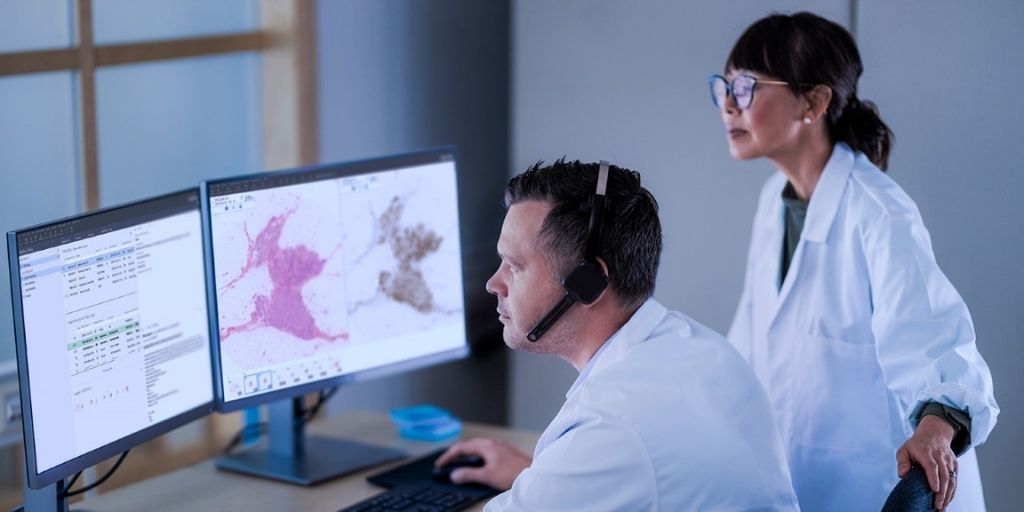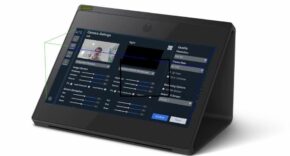
Northern Ireland becomes the first UK region to combine pathology and radiology images and reports in the same medical imaging system, following pathology tech go-lives with partner Sectra that will modernise diagnostics for healthcare professionals and patients
Health and Social Care Service in Northern Ireland has successfully digitised pathology diagnostic images and reports into an innovative medical imaging system that will help to future proof diagnostics for healthcare professionals and benefit patients across the region.
The digital pathology project, which has been implemented by Business Services Organisation (BSO ITS), is part of Northern Ireland’s Picture Archiving and Communication System (NIPACS), which already helps busy radiologists make important decisions, and will now also help pathologists respond to the increasing demands being placed on services.
Karen Bailey, Interim Chief Executive of Business Services Organisation (BSO) said: “Despite the challenges COVID has presented to the health service here, I am proud that our Digital Pathology project team and stakeholders have delivered the Digital Pathology Project which will provide significant benefits to HSC Staff, Service delivery and most importantly our patients”.
Pathologists across the region, perform around 40 million diagnostic tests each year. Due to the implementation of digital pathology, microscopes and glass slides are being replaced for high quality digital images that pathologists can instantly access from almost anywhere. This is enabled through the digital solution which has now been implemented region-wide across four HSC Trusts, following several go-lives since an addendum contract signing in 2019.
Dr Clare McGalie, responsible for the Digital Pathology project said: “I am very impressed with the system which is helping us to come together as a region. We now have the potential for our four laboratories to act as one virtual laboratory. Annotation and measurement tools are particularly useful for skin and breast reporting. Remote working and home working is important in making our workforce more mobile and flexible. There is a lot of work underway worldwide to bring forward AI in pathology. With our digital pathology system, we will be ready to embrace that in Northern Ireland.”
Nicky Harvey, NIPACS programme manager for Business Services Organisation (BSO) said: “Digital pathology is a huge transformation for Northern Ireland. Healthcare professionals work as part of multi-disciplinary teams, so having a range of imaging and information in one system is extremely valuable when it comes to collaboration and enabling more complete diagnostic reporting.”
Radiologists in the region already use the same PACS to examine x-rays, ultrasounds, CT scans, MRIs and more, all of which is also now instantly available alongside pathology images in a single imaging record, to help healthcare professionals make more informed judgements around cases.
The implementation of the digital pathology project has been supported by medical imaging supplier Sectra.
Jane Rendall, managing director for the UK and Ireland at Sectra, commented: “Northern Ireland is a fantastic example of integrated diagnostics in practice at a time when the hospitals across the UK are seizing the opportunity to modernise diagnostics. We are proud to be a long term partner for Northern Ireland in its journey, and it is rewarding for our teams to see clinical and patient benefits being realised so quickly. We hope this is only the start of a continuing journey of innovation and inspiration.”
The success of the digital pathology project has also received great support from clinical professionals in Northern Ireland.
Dr Paul Kelly, a pathologist and co-clinical lead for the initiative at Belfast Health and Social Care Trust’s Royal Victoria Hospital, added: “Digital pathology has shown us the future and what is possible. It has increased the appetite for collaborative working, being able to instantaneously seek or provide second opinions via the chat functionality in the system. It has increased the quality of reporting for many patients.”
The way workload and turnaround times of important reports is managed is also undergoing change.
Robbie Wilson, discipline manager for the Institute of Pathology at the Belfast Health and Social Care Trust, said: “This represents the most significant change in cellular pathology in more than 150 years. The project has delivered a lot for biomedical science and management as we now have a live overview dashboard of all of our cases and reporting status. Granular information across specialities is completely changing our turnaround time analysis, with the potential to set more accurate expectations for clinicians and patients on when they will get results. We can more easily identify and flag routine and urgent cases.”











